- Home
- Elif Shafak
Honor Page 10
Honor Read online
Page 10
Only seconds later the dogs reached the garden and hemmed him in on every side. One came dangerously close, crouching. Just as it was about to attack, the girl clapped her hands and shouted, in a voice mixed with authority and amusement, words that Adem could not comprehend. The effect was magical. One by one the animals sat down, their heads low, their tails between their legs.
Adem stared at his saviour, annoyed at having been rescued by a girl, but deeply relieved. She had a dimple in her left cheek, and large, liquid eyes, evenly spaced, the colour of a bottomless lake. In her hand was some kind of pastry, which she eagerly went back to devouring. He had never seen a girl with such an appetite.
‘You scared of dogs?’ she asked.
He didn’t respond.
‘If they know that, they’ll frighten you. Smart animals! My sister loves them.’ She leaned forward as if revealing a secret. ‘I don’t.’
She spoke Turkish with a heavy accent. An ignorant Kurdish girl, he thought. Probably lice-infested. He shot a glance at her neatly plaited hair, chestnut-brown with glints of gold and amber. So strong was the urge to touch her plaits that he raised his hand, but then stopped it in mid-air.
‘How is it that you know Turkish, when most people in the village don’t?’ he said.
‘I went to school. All my sisters did. Father insisted.’
Adem’s eyes scrutinized the house, inspecting the dresses, skirts and socks pegged to a line, drying. ‘How many sisters do you have?’
‘I’m the eighth girl in the family.’
‘Wow. And no boys?’
Shaking her head, she changed the subject. ‘Hey, would you like some? I made it.’
He took the piece of pastry she offered and sank his teeth into the rich, fluffy dough. He wasn’t expecting it to be so good. The dogs looked up expectantly, wagging their tails. Under their reproachful eyes, the two ate in silence, not knowing how to keep the conversation going.
‘I live in Istanbul,’ Adem said, when he found his voice again.
‘Really? Everybody says it’s beautiful.’
‘True,’ Adem answered with a trace of pride. He decided he was beginning to like her. There was a lightness to her manner that he found fascinating, and the ease with which she spoke soothed him.
‘May I ask you something?’ she said suddenly, and went on without waiting for an answer. ‘Is it true that the cobblestones of Istanbul are made of gold?’
What kind of a girl was this, Adem wondered – brave enough to confront a pack of wild dogs but so naive as to believe in such nonsense. Yet he was smitten by her charm, and heard himself say, ‘Yes, they are. If you were to marry someone like me, you could come to Istanbul to see for yourself.’
She blushed. ‘Why would I marry you?’
‘Because I can take you far away.’
‘I don’t want to go afar. There is more than enough here.’
He was still considering how to respond when they heard a woman’s voice coming from the house. She jumped to her feet and stood facing him, holding his eyes with the intensity of her stare. Then she turned to the dogs and, shaking a finger, shouted, ‘Leave him alone.’
As soon as she disappeared, Adem began to inch his way out of the garden. The leader of the pack watched him intently, and, just as he passed by, it growled, giving him such a jolt that he dropped what remained of the pastry. Dismayed, he looked at the mushy mess on the ground, the sugar mingling with the soil.
There were no golden pavements in Istanbul. Or anywhere else in the world. No dreams to pursue. Such things existed solely in legends and fairy tales. The real world with its real people resembled a mixture of sugar and soil, and was, more or less, of the same taste. Didn’t she know that?
*
The next day Adem attended the wedding, which was like nothing he had ever seen before. A courtyard filled to the brim with men of all ages sitting in a half-circle, a musician bashing away at his drum while another played the clarinet, children running around unattended, and women watching from the flat rooftops, their faces half covered, their hands hennaed. Adem noticed that the unmarried men were careful not to look upwards, and he did the same, keeping his eyes level.
Across from the entrance were the groom’s father and the bride’s father, sitting side by side but without exchanging a word. Depending on their rank or degree of proximity, relatives were positioned on either side. The bride and the groom were in the centre, where everybody could scrutinize them to their heart’s content. The groom had been newly shaved, and he smiled often. It was impossible to know how the bride felt, for her face was hidden under a glittery, crimson veil. From time to time a woman tiptoed close, bringing her something to drink. Together they lifted her veil ever so slightly so that she could sip without spilling anything on to her clothes, and without being seen.
Adem was planning to sit in a quiet corner when the headman spotted him and bellowed, patting the seat beside him. ‘City-boy, come next to me.’
So he did. He sat there good-humouredly, enjoying the celebration, until the man next to him pulled out his gun and began to fire it in the air. Immediately, others followed. The sound was deafening. One of the bullets hit the roof of a house near by and left a hole there, dust showering from the boards. Fearful of being shot, Adem glanced around in panic, and in the swirl of chaos he caught his breath at the sight of her, standing on a flat roof, looking at him, calm and composed, as if she were aware of being the only serene thing in a world out of control.
As soon as the shooting subsided Adem excused himself to look for a toilet, though what he really wanted was to find a way to talk to her. No sooner had he walked out of the main gate than he spotted her, sitting by a well, immersed in preparing a huge pot of yoghurt drink. When had she come down from the roof?
‘It’s good to see you again,’ he said.
She gave him a cold glare. ‘What are you talking about?’
It occurred to Adem that she was pretending not to have seen him before, for reasons of modesty and reserve that were, no doubt, required of a young woman in a place such as this. He decided to play along. ‘I’m sorry, I shouldn’t have intruded. You don’t know me, of course. My name is Adem. May I learn yours?’
‘And why should I tell you my name?’ she snapped, her lips twisted in a scowl, a dimple in her right cheek.
Her eyes were different today, the same and yet altered, glowing with a condescending sparkle, or so it seemed to him. For a sinking moment he suspected she was making fun of him. He excused himself and ambled away.
When he returned, having taken a leak behind a bush and calmed somewhat, she was no longer by the well. The bride was leaving for her new house, mounted on an ivory horse that was pulled by a boy, so that she, too, would bear sons. The animal’s mane was decorated with scarlet ribbons and evil-eye beads, its tail braided. While a group of children and a number of women followed the horse, ululating and clapping, the male guests prepared to sit down for the wedding dinner. Large, round, copper trays were carried inside by youngsters. As he strode back, Adem could smell the flat bread and meat. Upon entering the courtyard, he saw her again. She seemed in a hurry, carrying a crying toddler.
‘Why are you angry at me?’ he asked, blocking her way.
‘What? Why should I be angry at you?’ she said with a peal of laughter. Even the child in her arms seemed engrossed, suddenly quiet.
‘Then why didn’t you tell me your name?’
Tucking a lock of hair into her loosely tied scarf, she smiled. ‘Because you didn’t ask. But, since you are now, it’s Jamila.’
He nodded, grateful.
‘What about your name?’
‘But I told you a minute ago,’ he said in a throaty whisper.
A bemused look crossed her face. ‘Maybe you talked to Pembe, my twin sister. When did you see her?’
As if prompted by t
he question, the shooting started again. The child broke into a wail, and Jamila had to rush her out of the courtyard. Adem stood there, feeling slightly dizzy but also relieved. A twin! Yes, that explained it all. The harsh demeanour, the frosty stare. That was not Jamila. Not his Jamila.
In the evening Adem stood by the window and watched the moonlight crest on the roofs, shedding silver streaks across the village. The house lights resembled glints of cigarette tips in the dark. He had missed Istanbul and was glad that he would be leaving soon. Yet what was he going to do without Jamila?
He went to see the headman, whom he found in his nightgown, smoking his pipe. There was an oil lamp beside him, which reflected shadows across the walls, creating hollows under his eyes. ‘I want to give you this baklava and thank you for your hospitality and –’
‘Ah, I cannot eat that. I wish I could,’ the headman said wearily. ‘Diabetes.’
Adem stared at the box in his hand. Maybe it was meant for someone else. He took a deep breath. He had planned to approach the matter indirectly, but now he could see there was no way to do that. ‘Today at the wedding, I saw a girl.’
‘A girl?’
Slowly, Adem watched the man’s face as he raised his eyebrows, taking in the implication. Oh, God! The boy thinks he has fallen in love.
‘Tell me about this girl,’ the headman urged. ‘What’s her name?’
‘Jamila,’ Adem replied, feeling his face grow hot.
‘Jamila . . . I don’t know any Jamila.’
‘Long brown hair. Big green eyes.’
Taking slow puffs from his water pipe, the headman shook his head. ‘Nope. There’s no such girl here.’
‘She speaks Turkish.’
‘Oh . . . I think I know who you mean. Berzo’s girls. They all went to school. Are you referring to Enough Beauty?’
‘Enough Beauty?’
‘Yes, she and her twin, they were named twice. Pink Destiny and Enough Beauty,’ said the headman, but offered no other explanation. ‘Look, you’re too young to know this, but a man’s love is the reflection of his character.’
Adem listened, not knowing what to make of this.
‘If the man is quarrelsome, his love is full of fights. If he is placid and kind, his love is a balm. Should he pity himself all the time, his love will crumble to dust. If he is a jolly chap, his love will abound with joy. Before losing your heart to a woman, you need to ask yourself what kind of love can you give her?’
‘Well, I’m a good man,’ Adem said.
‘The only good man I know of was the prophet, may peace be upon him,’ said the headman. ‘Anyway, Berzo has too many girls. Custom requires that they marry the eldest one first. And Jamila is the youngest. However, I can see that it might be a perfect match. The family has gone through hardships. The mother, Naze, died in childbirth, poor woman. She so wanted to have a son. Berzo got married again. But the new wife has given him no children yet. And then the eldest girl, Hediye . . .’
‘What happened?’
‘That man is doomed, son. He might want to marry off the girls quickly. Jamila might not have to wait.’
Adem broke into a grin. There was a hope, after all, however slight.
‘But don’t forget they are poor,’ the headman whispered. ‘Your father and brothers might not approve of a Kurdish bride, a villager. On the other hand . . . your family doesn’t have the best of reputations since your mother ran away with another man. Perhaps it’s better for you to choose someone here, out of the way.’
All at once Adem’s face darkened. He’d had no idea that the man knew about his family’s shame. Words, like wandering tribes, were of no fixed address. They travelled far and wide, scattering over the earth.
A Love Like a Comet
A Place near the River Euphrates, December 1977
In the stillness of the night, Jamila was dozing by the fireplace, her head tilted to one side. Her left hand was dangling over the edge of the chair and her right hand was firmly clutching a letter. She had fallen asleep while reading it for the fifth time.
Her sleep was uncomfortable, full of demons. Colour had rushed into her cheekbones, and a light sheen of sweat gleamed on her face. In her dream she was in a town that looked both oddly familiar and unlike anywhere else in the world. A river ran through its centre, wide and unruly, with vessels of all sizes lapping at their moorings, bobbing up and down. Jamila found herself alone on the waterfront, peeking inside one of the fishing boats. There was a gathering of people inside the cabin, their expressions sullen, their bodies pliant and viscous, as if made of wax. They were talking fervently about . . . her.
A half-moan, half-sigh, escaped Jamila’s lips. One of the group – a man who strangely resembled Adem – noticed her and alerted the others. Furious and spiteful for no reason at all, they scampered off the boat and on to the dock, hunting for her. She sprinted away as fast as she could, passing through serpentine alleyways and cobbled squares, but soon she got tired, her feet heavier than cement blocks. She would wake up in a little while: when her pursuers finally cornered her in a blind alley, she would catapult herself, with all her might, out of the dream, panting. But at the moment she was still there, in the town of her nightmare.
The air in the hut felt musty, stale. The last log in the fireplace cracked and burst into flame, sending out a shower of golden sparks like dust from a magic wand. Outside in the valley a bird cried out. There were footsteps, but they were distant, indistinct. Jamila didn’t hear them. Not yet. She was still running for dear life, having just turned the bend into the dead-end street.
Right now, Jamila’s face looked older than that of a 32-year-old woman. There were wrinkles around her neck, twisty lines that resembled an arcane alphabet chiselled in wood. The truth was she had stopped feeling young years ago.
With a sudden jerk Jamila’s body was pulled back and she woke up, the carved panel of the chair imprinted on her cheek. There was such a nasty pain in her left shoulder that she dared not move at first. Gently, she massaged her stiff limbs with one hand while still holding the letter with the other. For a moment she stared at the paper through empty eyes, as though she had forgotten what it was. But, unlike the boats in her dream, the letter was real. It was as real as the mountains that surrounded her and just as portentous. Jamila began to read it again.
Sister of mine,
Since I came to this island, where I have yet to see the sea, I have wished many times that you were by my side. But never as much as I do now. If you were here, I would put my head in your lap, and tell you that I am falling. Will you hold me?
Adem is no husband to me. He doesn’t come home any more. He has found himself another woman. The children don’t know it. I keep everything inside. Always. My heart is full of words unsaid, tears unshed. I don’t blame him. I blame myself. It was the biggest mistake of our lives that I was his bride, instead of you. It’s true, he never loved me the way he loved you. He is a man who has many regrets and no courage. I feel sorry for him.
How I wish we were children again, you and I. Stealing coins from wish fountains. If only we knew then what we know now.
Did I tell you what Adem once said to me? ‘I wish I had a magic eraser,’ he said. ‘There are so many things I would like to change.’ And, though he didn’t confess this, I know he also meant us. I should have never married him. It wasn’t in my hands, but I didn’t try to prevent it. Not really. I so wanted to get out of the village. He was my ticket to other lands. Jamila, you must be upset at me, are you? I would be, if I were in your shoes.
Do you ever think of our sister Hediye? The other day I made halva for her soul. I distributed it to my neighbours. They were a bit surprised, not being familiar with our customs. It was a shame that we didn’t mourn her the way we should have. Do you feel the same way?
Your loving half, Pembe
Jamila stood up, rubbing the call
uses on the palms of her hands. She approached the window and peered into the night. She thought she had heard a sound, but upon listening more carefully, she doubted it. Sighing, she went back, put the kettle on the stove and began to make tea.
*
‘There are so many stars in the sky tonight,’ Adem had said. It was a bone-chilling evening in the year 1961.
Leaning closer, his eyes raking her face, Adem told her that some loves were like the brightest stars. They winked at human beings, filling hearts with hope and joy, even when the times were bad. Some other loves resembled the Milky Way, with the ghosts of their ancestors trailing behind in a pale stripe of afterglow.
‘What about our love?’ Jamila asked. ‘Is that a star too?’
Adem flinched at the ease with which she embraced the word. He had been contemplating how to tell her that he loved her, but here she was saying it herself. She was brisker than him, and bolder. For him everything was happening too fast, leaving him dazzled and intimidated in equal measure. Yet there was no time to wait for time to catch up with them. No time to walk holding hands, no time to taste furtive kisses, no time to get to know each other.
His face wore a gallant smile as he said, ‘Our love is a star with a huge double tail. Do you know what that is?’
Jamila had shaken her head.
‘It’s called a comet.’
‘A comet . . . ’ Still repeating the word, Jamila leaped to her feet, grabbed the sickle off the wall and hacked off a lock of her long hair.
‘For me?’ Adem asked, surprised.
‘It will remind you of me. Always keep it with you.’
In her face were affection and concern, and something that he hadn’t seen in anyone else: trust.
‘I don’t need to keep it with me; you’ll be next to me all the time,’ he said. But he put her gift in his pocket, as if he didn’t believe his own words.

 Black Milk: On Writing, Motherhood, and the Harem Within
Black Milk: On Writing, Motherhood, and the Harem Within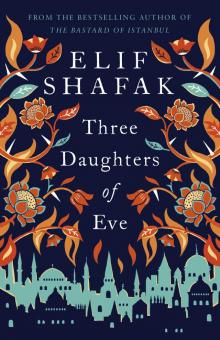 Three Daughters of Eve
Three Daughters of Eve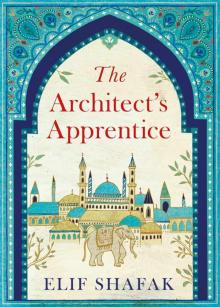 The Architect's Apprentice
The Architect's Apprentice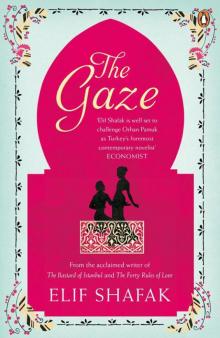 The Gaze
The Gaze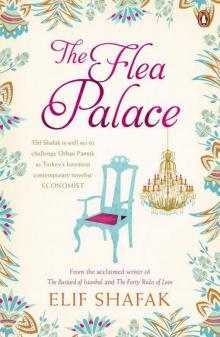 The Flea Palace
The Flea Palace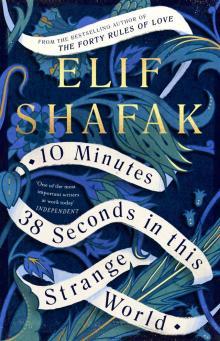 10 Minutes 38 Seconds in this Strange World
10 Minutes 38 Seconds in this Strange World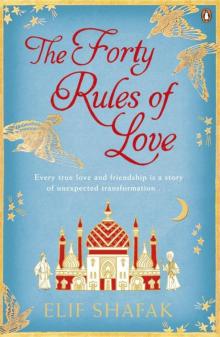 The Forty Rules of Love
The Forty Rules of Love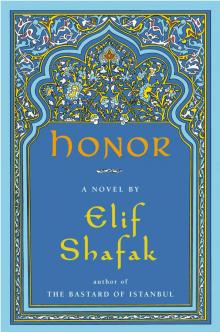 Honor
Honor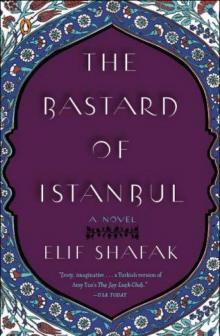 The Bastard of Istanbul
The Bastard of Istanbul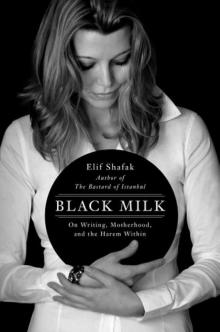 Black Milk
Black Milk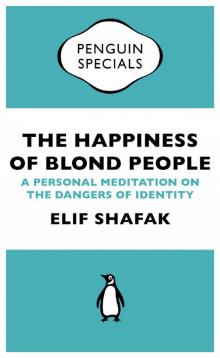 The Happiness of Blond People (Penguin Specials)
The Happiness of Blond People (Penguin Specials)